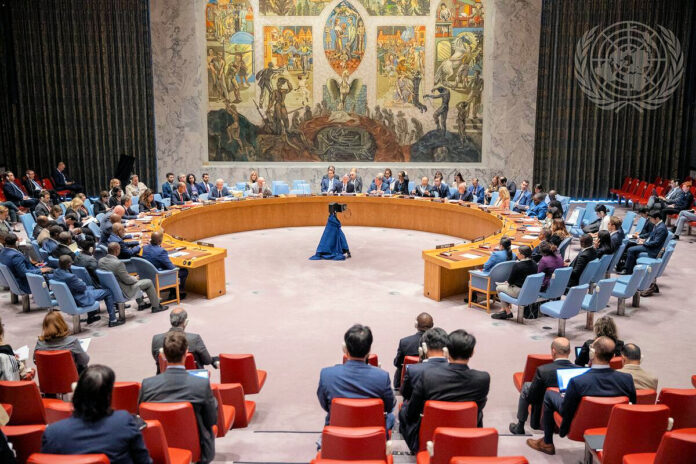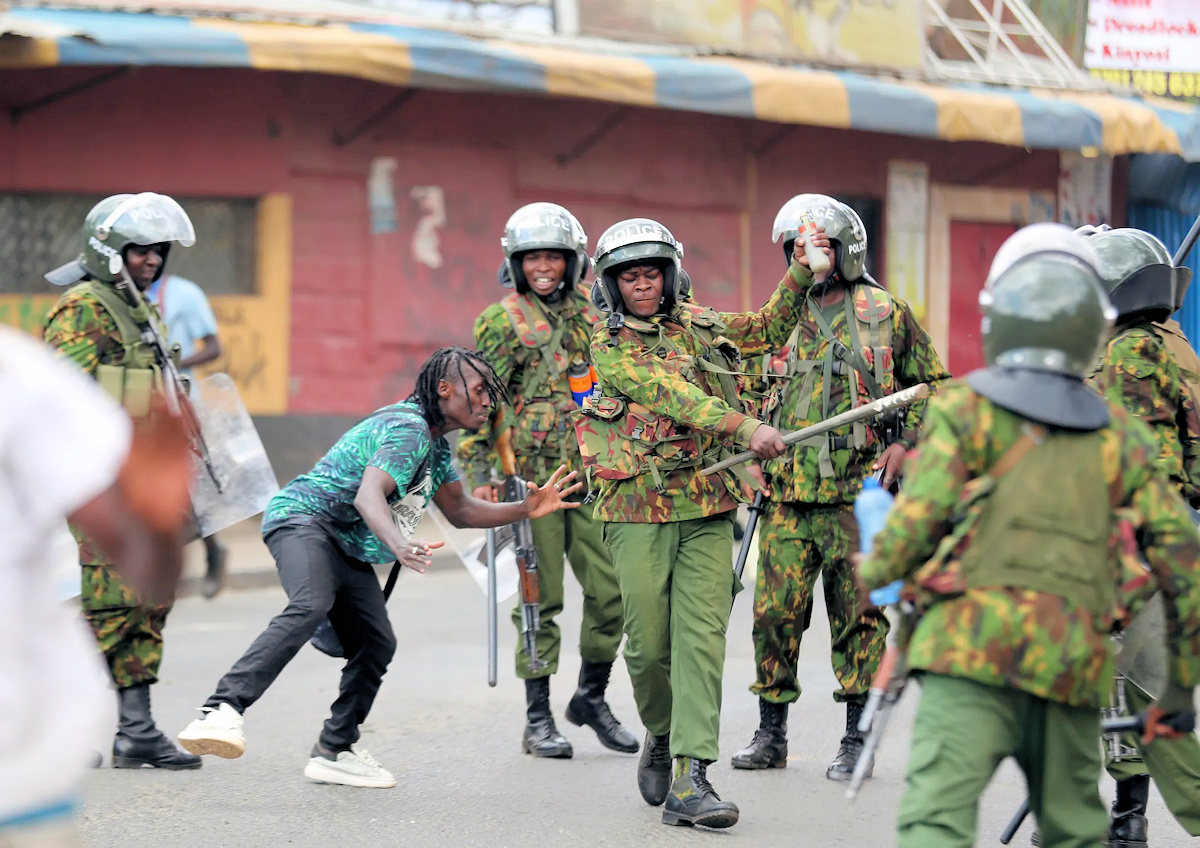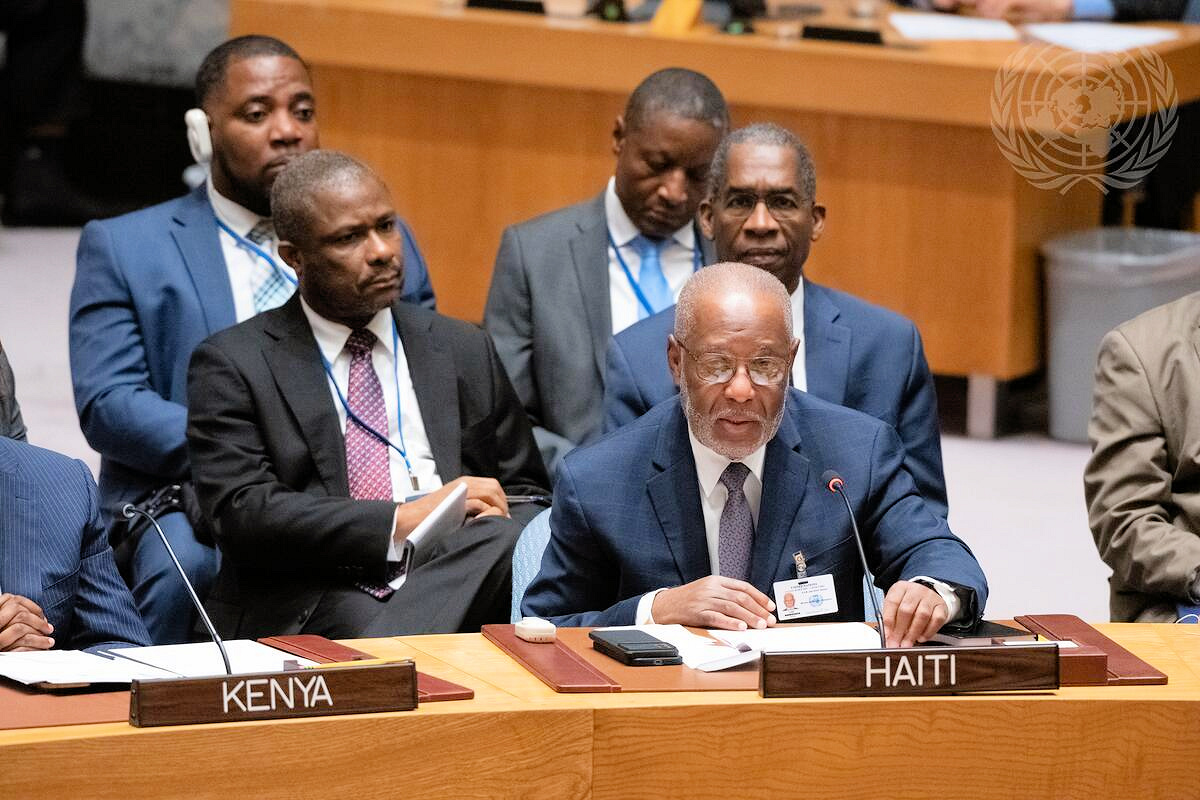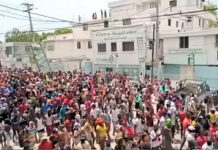
(Français)
The body took a year to do it, but the United Nations Security Council at last voted on Oct. 2, 2023 to deputize a non-UN military force rustled up by Washington to again intervene in Haiti for the third time in three decades.
After seven revisions over one month of negotiations, 13 of the 15 UNSC member nations voted for Resolution 2699, drafted by the United States and Ecuador, to “authorize” for one year the so-called “Multinational Security Support” mission (MSS), a collection of 13 nations that will be led by a contingent of 1,000 Kenyan police officers.
Russia and China abstained from the vote due to uncertainty about the mission’s real goals or viability.
This proposed invasion is thus different from those of 1994 and 2004, which involved bonafide UN blue-helmeted “peacekeepers” under the control and oversight of the Security Council itself. The MSS’s unprecedented formula would be nominally overseen by Kenya, but actually by the U.S..

Washington wanted the mission, which de facto Prime Minister Dr. Ariel Henry’s government requested from the UNSC on Oct. 6, 2022, to have the cover of the UN’s blessing, which both the Washington Post and New York Times dutifully noted was “not required.”
This is because the deployment is triply illegal: 1) under Kenya’s constitution, according to former Kenyan Chief Justice Dr. Willy Mutunga, 2) under Haiti’s 1987 Constitution, in which Article 263-1 explicitly prohibits foreign troops on Haitian soil, and 3) even under the UN Charter’s Chapter 7, Article 43, which only authorizes the deployment of troops “to maintain or restore international peace and security,” that is, armed conflict between states, not internal strife.
The last time Washington was able to use the UN like this to sanctify its designs was as a chariot for the Korean War 73 years ago, when the Soviet Union was temporarily boycotting the UNSC and Chiang Kai-shek’s Taiwan held the permanent seat which now belongs to the People’s Republic of China.
U.S. Ambassador Jeffrey DiLaurentis expressed satisfaction with the vote when explaining that Washington had managed “to create a new way of preserving global peace and security” that could end-run the modern multipolar reality of China and Russia veto power over UN “peace-keeping” in the council.
Russia’s “justified requests for details on the concept of this operation, modalities of the use of force, and contingent withdrawal strategies were left unanswered,” complained its Ambassador Vassily Nebenzia in his post-vote statement. “Besides, we received an impression that this non-UN mission was going to obtain UN-grade legitimacy via an undercooked and insufficiently considered decision by the Council.”
“Russia cannot agree to invoking Chapter 7 almost blindly,” Nebenzia continued. “Haiti’s history has sufficient experience of irresponsible foreign interference, which is exactly what kicked off a spiral of degradation which Haiti’s people have been unable to overcome for years. For us to authorize another use of force in Haiti without being fully cognizant of the mission’s parameters is an imprudent thing to do. Besides, the operation’s concept should be submitted to the Council for endorsement rather than to be studied as a fait accompli.”
“Proceeding from the principles of respect for sovereignty and non-interference in internal affairs, China has always taken a cautious and responsible approach on the Council’s invocation of Chapter 7 on the authorization of the use of force,” said China’s Ambassador Zhang Jun in explaining his nation’s abstention. Previously, “there have been precedents of abusing Chapter 7 authorization… Without a legitimate, effective, and responsible government in place, any external support can hardly have any lasting effects.”
But despite the mission’s professed goal of merely providing “technical assistance to support the Haitian National Police,” Kenya, and by extension Washington, will be running Haiti when the force arrives since “the rules of engagement and any directives on the use of force are to be developed by the leadership of the Multinational Security Support mission,” which only needs to “consult” with “Haiti and other Member States participating in the MSS,” the resolution says.
Indeed, a former Air Force Special Operations Command airman, who is in constant touch with U.S. Special Forces that deployed to Haiti over a month ago, scoffed at the notion that Washington’s troops or the MSS were just “helping” Haiti.
“Are you assisting the Haitian government? Yes. Are you controlling who’s in the Haitian government? Yes. Are you influencing who’s in that government? Yes,” Jean-Pierre Alfred told Redacted’s correspondent Dan Cohen. “So essentially you’ve crossed the lines of just assisting. Now you are controlling, and doing, and deciding.”

In this sense, the Russian ambassador was justified in stating in his abstention explanation: “Any interference in the internal political process by external forces is inadmissible.”
Alfred also noted that the UN vote was really more for appearances than anything else. “If the resolution doesn’t pass, it doesn’t matter,” he said before the vote. “All that means is that instead of overt action, now you have covert action, and the covert action has been taking place without the resolution. As I said, [U.S.] Green Berets have been on the ground for the last 45 days at least.”
Haitian Foreign Minister Jean Généus called the vote “an expression of solidarity with a population in distress.”
The Kenyan police force is notorious for its brutality and corruption. It has even run death-squads and been asked to cover up its murder of demonstrators, according to multiple human rights groups and the Associated Press.
Since it is not a UN force, the MSS is not getting UN funds and must rely on voluntary contributions from other nations. Washington has pledged $200 million for the MSS, but delivery of that sum is far from guaranteed. No other state has stepped up yet.
The other nations which have agreed to join the MSS include Jamaica, Bahamas, Antigua and Barbuda, Italy, Spain, Mongolia, Senegal, Belize, Suriname, Guatemala, Peru, and Barbados.











[…] showdown happens just as the Multinational Security Support (MSS) mission, deputized by the UN Security Council on Oct. 2, is due to begin deploying in Haiti. The mainstay of this fourth foreign military intervention into […]
[…] showdown happens just as the Multinational Security Support (MSS) mission, deputized by the UN Security Council on Oct. 2, is due to begin deploying in Haiti. The mainstay of this fourth foreign military intervention into […]
[…] showdown happens just as the Multinational Security Support (MSS) mission, deputized by the UN Security Council on Oct. 2, is due to begin deploying in Haiti. The mainstay of this possible fourth foreign military […]
[…] But the second legal defeat was the ruling by Kenya’s High Court that Kenyan police could not be constitutionally deployed to lead the Washington-devised Multinational Security Support Mission (MSS) to Haiti, endorsed by the UN on Oct. 2, 2023. […]
[…] les livraisons de matériel et de munitions et le déploiement des forces accusent des retards. Béni par le Conseil de sécurité de l’ONU (avec l’abstention de la Russie et de la Chine) le 2 octobre 2023, ses 200 premiers soldats […]
[…] MSS, blessed by the Security Council in October 2023, was supposed to have 2,500 policemen, but as of today it is only 860 (including 70 […]
[…] was from 2004 to 2017. It is instead, until now, a U.S.-(under)funded mercenary force which merely has a UNSC “blessing” to deploy in Haiti. This is the compromise that was struck between Washington with China and Russia […]
[…] présent, d’une force mercenaire (sous-)financée par les États-Unis, qui bénéficie simplement de l’autorisation du Conseil de sécurité de l’ONU pour se déployer en Haïti. C’est le compromis trouvé entre Washington, la Chine et la Russie, qui s’opposent […]